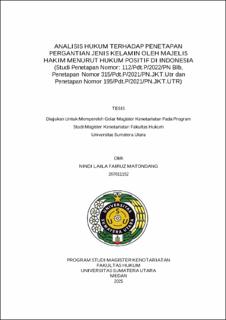| dc.contributor.advisor | Sembiring, Rosnidar | |
| dc.contributor.advisor | Sembiring, Idha Aprilyana | |
| dc.contributor.author | Matondang, Nindi Laila Fairuz | |
| dc.date.accessioned | 2025-03-18T05:35:15Z | |
| dc.date.available | 2025-03-18T05:35:15Z | |
| dc.date.issued | 2025 | |
| dc.identifier.uri | https://repositori.usu.ac.id/handle/123456789/102225 | |
| dc.description.abstract | In Indonesia, the phenomenon of gender change through court rulings has become a significant issue within the franework of positive law, as seen in Decision Number : 112/Pdt.P/2022/PN Blb, Decision Number : 315/Pdt.P/2021/PN.JKT.Utr and Decision Number : 195/Pdt.P/2021/PN.JKT.UTR. Althrough there is no specific regulation governing such matters, judges have rendered decisions based on medical, psychological, social, and juridical cobsiderations to ensure legal certainty for applicants. This study aims to examine the provisions related to gender change decisions within the framework of Indonesian positive law, analyze the reasons for gender change requests in Decision Number : 112/Pdt.P/2022/PN Blb, Decision Number : 315/Pdt.P/2021/PN.JKT.Utr and Decision Number : 195/Pdt.P/2021/PN.JKT.UTR and to evaluate the judicial considerations in granting these requests.
This research employs normative legal methods using secondary data analysis through literature studies and interviews, analyzed qualitatively to address legal issues surrounding gender change rulings.
The study reveals that, in the context of Indonesian positive law, there are no specific regulations governing gender change, although related provisions such as Law No. 24/2013 on Population Administration exist. Among the three decisions analyzed, namely Decision Number : 112/Pdt.P/2022/PN Blb, Decision Number : 315/Pdt.P/2021/PN.JKT.Utr and Decision Number : 195/Pdt.P/2021/PN.JKT.UTR, most applications were based on discomfort with biological conditions, with one case linked to medical issues. Juducal considerations in granting these request varied, where Decision Number : 112/Pdt.P/2022/PN Blb emphasized medical and religious aspects, while the other two decisions did not explicitly consider religious values in their rulings. | en_US |
| dc.language.iso | id | en_US |
| dc.publisher | Universitas Sumatera Utara | en_US |
| dc.subject | Legal Analysis | en_US |
| dc.subject | Judical Decision | en_US |
| dc.subject | Gender Change | en_US |
| dc.title | Analisis Hukum terhadap Penetapan Pergantian Jenis Kelamin oleh Majelis Hakim Menurut Hukum Positif di Indonesia (Studi Penetapan Nomor: 112/Pdt.P/2022/Pn Blb, Penetapan Nomor 315/Pdt.P/2021/Pn.Jkt.Utr dan Penetapan Nomor 195/Pdt.P/2021/Pn.Jkt.Utr) | en_US |
| dc.title.alternative | Legal Analysis of Gender Reassignment Determinations by Judges Based on Positive Law in Indonesia (Case Study : Determination No.112/Pdt.P/PN Blb, Determination No. 315/Pdt.P/2021/PN.JKT.Utr and Determination No.195/Pdt.P/2021/PN.JKT.Utr) | en_US |
| dc.type | Thesis | en_US |
| dc.identifier.nim | NIM207011152 | |
| dc.identifier.nidn | NIDN0002026602 | |
| dc.identifier.nidn | NIDN0014047609 | |
| dc.identifier.nidn | KODEPRODI74102#Kenotariatan | |
| dc.description.pages | 147 Pages | en_US |
| dc.description.type | Tesis Magister | en_US |
| dc.subject.sdgs | SDGs 16. Peace, Justice And Strong Institutions | en_US |


